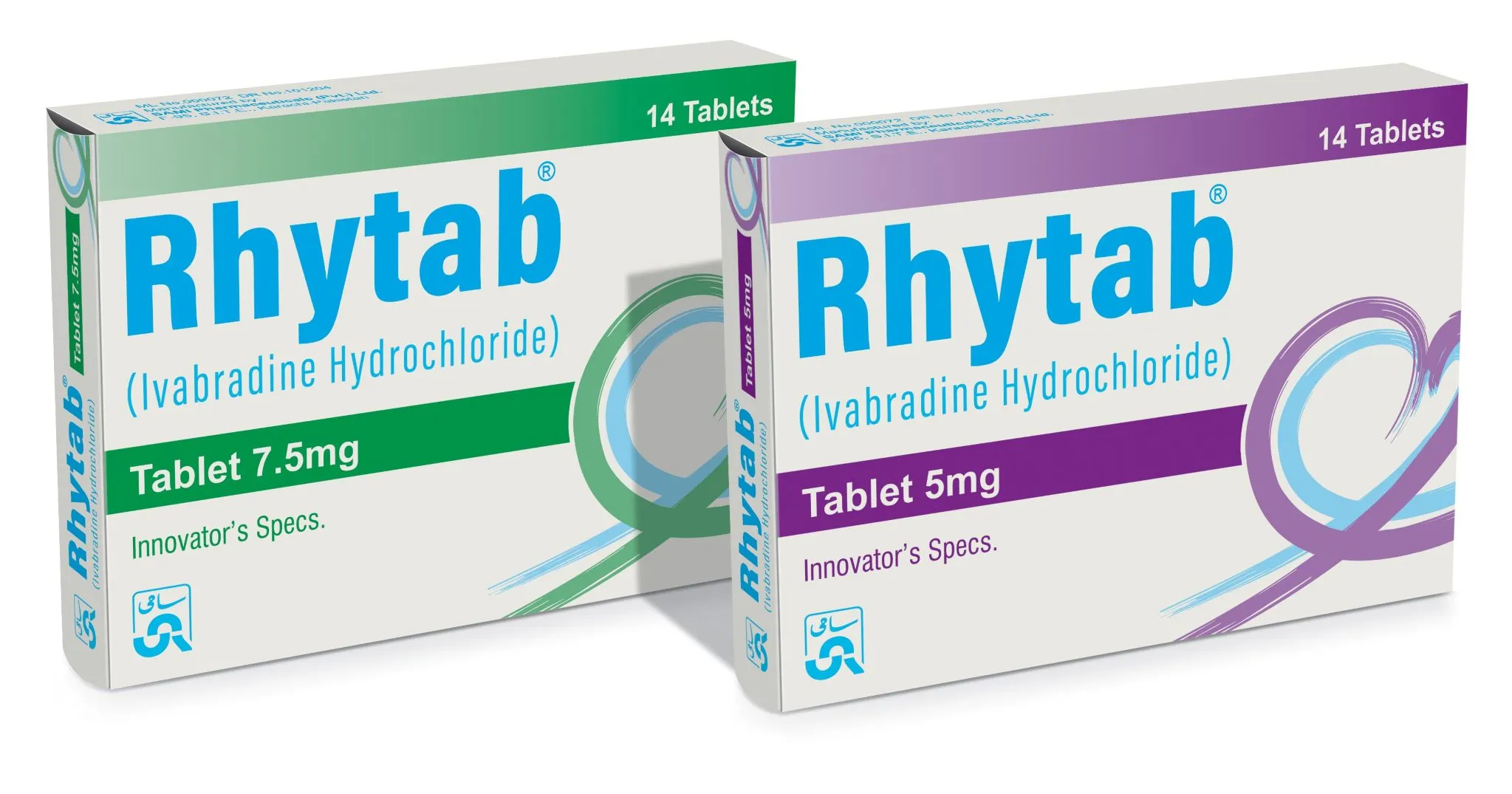Description
Generic Name: Ivabradine Hydrochloride
Brand Name: RHYTAB
Strength: 5mg per tablet
Form: Oral tablet
Pack Size: 14 tablets per pack
Pharmacological Class: If-channel inhibitor
Prescription Status: Prescription-only (Rx)
Overview:
RHYTAB 5mg Tablet contains Ivabradine Hydrochloride, a medication used primarily to treat chronic heart failure (CHF) and angina (chest pain). Ivabradine works by selectively inhibiting the If current (funny current) in the sinoatrial node of the heart, which is responsible for regulating heart rate. By reducing the heart rate without affecting other aspects of heart function, Ivabradine can help reduce the workload on the heart and improve symptoms of both heart failure and angina.
This medication is particularly useful for patients who are unable to tolerate beta-blockers, or for those who need additional treatment alongside their current heart failure or angina regimen.
Mechanism of Action:
Ivabradine selectively inhibits the If current (also known as the funny current) in the sinoatrial node, the natural pacemaker of the heart. This current is responsible for regulating the heart rate by facilitating slow depolarization of the cardiac cells. By inhibiting this current, Ivabradine slows the heart rate without affecting other parameters such as blood pressure, contractility, or conduction.
This results in:
- Reduced heart rate without impacting the force of heart contractions.
- Decreased myocardial oxygen demand, which is particularly beneficial in angina and chronic heart failure.
Indications:
RHYTAB 5mg Tablet is indicated for:
- Chronic Heart Failure (CHF):
- As an adjunct to standard treatment (such as beta-blockers) to reduce the risk of hospitalization and improve symptoms.
- Stable Angina Pectoris:
- In patients with chronic stable angina who are not adequately controlled by other treatments, including beta-blockers.
- Heart Rate Control:
- In patients who require heart rate reduction but cannot tolerate beta-blockers or need an alternative option.
Dosage and Administration:
- Initial Dose for Angina:
- 5mg taken twice daily, with food.
- If the heart rate is higher than desired (above 60 bpm), the dose can be increased to 7.5mg twice daily.
- Initial Dose for Heart Failure:
- 5mg taken twice daily with food, or adjusted based on heart rate and clinical response.
- In patients with a heart rate below 60 bpm, reduce to 2.5mg twice daily.
- Renal Impairment: Dose adjustments may be necessary in patients with renal impairment.
It is essential to monitor heart rate regularly during treatment. If the heart rate falls below 50 beats per minute, the dose may need to be reduced.
Side Effects:
Common:
- Bradycardia (slow heart rate)
- Visual disturbances, such as phosphenes (temporary visual phenomena, like seeing flashes of light)
- Headache
- Dizziness
- Fatigue
Less common but serious:
- Atrioventricular (AV) block (heart block)
- Syncope (fainting)
- Arrhythmias
- Severe bradycardia that may require dose adjustment
Precautions:
- Bradycardia: Since Ivabradine slows the heart rate, close monitoring is necessary, especially in patients with pre-existing heart conditions like sinus node dysfunction or AV block.
- Heart Rate Monitoring: Regular monitoring of heart rate is essential during treatment to avoid excessive slowing (bradycardia), which can cause complications.
- Pregnancy and Lactation: Ivabradine is classified as Category C during pregnancy, meaning its safety has not been well established, and it should be used only if the benefits outweigh the risks. It is not recommended during breastfeeding.
- Liver Impairment: Ivabradine is metabolized by the liver, and caution should be taken in patients with liver disease, especially those with severe hepatic impairment.
- Use with Caution in Patients with Low Blood Pressure: Ivabradine may further lower blood pressure, so it should be used cautiously in individuals with hypotension.
Drug Interactions:
- CYP3A4 Inhibitors (e.g., ketoconazole, ritonavir, clarithromycin): These can increase the plasma concentration of Ivabradine, increasing the risk of bradycardia.
- CYP3A4 Inducers (e.g., rifampin, phenytoin): These can decrease Ivabradine’s effectiveness by lowering its plasma concentration.
- Beta-blockers: Concomitant use with beta-blockers may further lower heart rate and should be carefully monitored.
- Antiarrhythmic Drugs: Drugs like amiodarone may increase the risk of heart block or other arrhythmias when combined with Ivabradine.
Storage Instructions:
- Store at room temperature (15°C to 25°C).
- Keep in a dry place and protect from moisture.
- Keep out of reach of children.
Packaging:
- Available in 14 tablets per pack, each tablet containing 5mg of Ivabradine Hydrochloride.
Key Benefits:
- Selective heart rate control without affecting blood pressure or myocardial contractility.
- Effective adjunct in the treatment of chronic heart failure and angina when other medications like beta-blockers cannot be used or are insufficient.
- Minimal side effects and well-tolerated by most patients when used as prescribed.
- Once or twice daily dosing enhances patient compliance.



Reviews
There are no reviews yet.